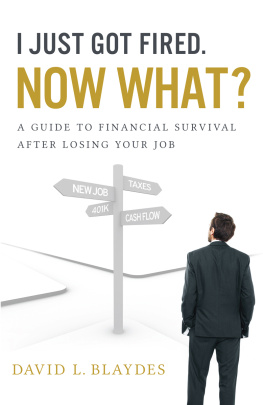Table of Contents
This book is dedicated to all my clients whose struggles and experiences have resulted in the advice and strategies that I hope will bring help and encouragement to the suddenly unemployed people who read this book.
Foreword
The Grapes of Wrath is part of the American subconsciousthe tragedy of the Joads being expelled from their farm in Oklahoma. A sequel that might have been written is how the Joad family and thousands of others wound up doing very well indeed in California.
A comparable, if less dramatic, event takes place in all parts of the country almost every day. A worker or officer of a business is separated unexpectedly. Whether the separation is a layoff or a discharge, the psychological and financial effects of being pink slipped can be severe.
I am reminded of a Scottish childrens rhyme, What can a poor monnie do, with such a contrary coo? What can be done? This book, written by my daughter, addresses this question with the hope that it may help those who are being given the dreaded pink slip. This book gives them courage to survive the ordeal, to remember that the sun will rise tomorrow, and, with luck, to think of it as the best thing that ever happened to them. Or at least not as the catastrophe it may first have seemed to be.
Since the years of the Great Depression, the federal government has created a variety of fiscal programs designed to help level out the peaks and valleys of our cyclical economy. The lows are neither as low nor as long as they once were. We rarely find entire communities or population segments unemployed for extended periods of time. Ironically, this improvement may actually cause a suddenly unemployed individual to feel a greater sense of isolation, which leads to the thought that if it isnt happening to everyone, there must be something wrong with me.
In my capacity as chairman of the Unemployment Compensation Review Commission of Ohio, I have become aware of the serious effects of finding oneself between assignments. Edie has made her career giving counsel to the persons who are skating on thin financial ice. It is an unwelcome river to cross, but many have managed the crossing, and so can you.
William W. Milligan,
Chairman, Unemployment Compensation Review
Commission of Ohio
Introduction
In Ohio in the 1970s, you had to be 16 years old before you could get a real job. Being tall for my age (heck, I was tall for anybodys age), I figured I could tell potential employers that I was 16 and it wouldnt really matter to them that I was still 15. Another by-product of being tall was that I was forced to learn to sew by the age of 12 if I wanted to wear anything that fit me. I really wanted to work in a fabric store, so I began stopping in regularly at the two stores in the shopping center a few blocks from my home, to see if they were hiring. It didnt concern me how many times I would have to bother them before I got a job. I just knew that eventually I would be working in one of those stores.
One afternoon, the manager of the larger store saw me walk through the door. Before I had a chance to say hello, he gave me this defeated look and sighed, Okay, you can have a job. After making sure that my 5 (in 15) looked an awful lot like a 6 on the application, I started to work the next weekend. With all the time I had spent in fabric stores, I already knew most of what they needed me to know. I was working at full speed very quickly. Because I was the only employee without a car or a boyfriend (another by-product of being tall), I was willing to work on Friday nights.
Shortly after I was hired, a larger company out of Texas acquired the firm, and they sent up a new manager. She systematically fired everyone except me because I was the only one who liked working on Friday nights. That made me valuable. Every Friday night I would show up for work and there would be a new co-worker for me to train. It was a slow night, which made it a good time to train new employees. I became the de facto training coordinator. A couple of months later the store was fully staffed, everyone was fully trained, and we were working very well together as a team, I thought.
I loved the job and the people and the $1.45 an hour that I usually spent entirely on fabric. Then one day, with no warning, the manager asked me into her office and explained that sales were down. She was overstaffed and needed to let somebody go. She thought it would be the most fair to let me go because I was the youngest.
Until I began writing this book, I had forgotten about that real-world lesson that I had been handed at a very early age. I remember being mad more than anything and very confused. Could she really do this? Who could I complain to? This was so unfair! I was the one who had been there the longest. I was the one who had trained all the new people who got to keep their jobs. I was the one who always straightened the remnant table without being asked. And I was the one who would work on Friday nights. Shell see when her remnant table gets messy; shell wonder why she laid me off. When she has people complaining about working on Friday nights, shell wish I were still there.
At that point I really was 16 and had experience, so I found another job easily. Even though this experience didnt scar me for life, it sure did sting for a while.
I always thought that the range of emotions that I experienced following that event were attributable to the fact that I was young. Now I know that I was wrong. It was my youth that actually enabled me to bounce back, move forward, get another job, and not worry about it. The older we get, the more difficulty we have dealing with layoffs. Just like deaths and other forms of serious loss, its something that we never really get used to. We develop strategies for dealing with them, but that doesnt mean they hurt less.
When we lose something dear to us, we grieve. My job in the fabric store was dear to me. It represented a level of accomplishment and responsibility beyond what most 16-year-olds were doing. It represented my first step toward independence, and it really was a lot of fun. For someone to take that away, in a split second, with a lame excuse, made no sense.
The incidence of layoff is increasing this year due to a normal downturn of the economy, pushed to depths not seen since the Great Depression of the 1930s. Entire industries are on the brink of collapse, accepting massive government bailouts. Other industries are restructuring their work forces to try to weather the economic storm. Early retirements, rolling unpaid days off, wage freezes, benefit cuts, and other strategies are helping companies hold on to valued employees until the economy rebounds.
Layoffs, or temporary gaps in employment, have always been a threat to workers in down economies. Some of the laid off workers would wait out the downturn, some would retrain for other work, and some would accept unskilled assignments. With the unemployment rate over 10 percent in many areas, the unskilled jobs are all taken. The wait seems very long and it is hard to know whether new skills will make a difference. In the past, layoffs were difficult, but the strength of the U.S. economy gave people hope that their distress would be temporary. While they were laid off, government and private systems kicked in to help out. But with a recession this severe, all of those resources are also stressed. These layoffs send people out into new territory requiring new survival skills, not just new work skills. Their homes are not sellable for a value they expect, their accumulated retirement savings balances are down up to 40 percent, and the tuition for retraining is more expensive than ever before.













